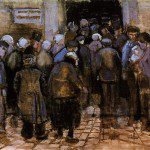
Thus, the last will be first, and the first will be last. (Matthew 20:16)
A lot hinges on “will.”
Here we have a future tense verb, an implication that, in some distant time, probably in Heaven, but maybe sooner, the first will get their comeuppance even as the last trot into their rightful place. Excuse me, but, though there’s truth in that idea, it sounds a bit like the old Joe Hill protest song: “The Preacher and the Slave”:
You will eat, bye and bye,
In that glorious land above the sky;
Work and pray, live on hay,
You’ll get pie in the sky when you die.
Johnny Cash, of course, had his rejoinder.
But no matter. The problem here is not futurity, but reality. I do not deny that many good, earthy people struggle as the abusive rich, the hypocrites, reap what they have not sown. Still, pride comes before the fall, as they say. And, at least, if I might draw on a recent experience, I suspect that being last is the best policy, the true means to a happy (read “blessed”) life.
Take, for example, a nice guy I met the other night while out playing pool with a couple friends. He had come to America at a young age, bereft of parents and siblings, he made his way here and took up work as a dishwasher. Twenty-some-odd years later he finds himself the head cook at precisely the same restaurant he started at long ago. Now, up from nothing, he’s the center of a small community, a motivator for his fellow immigrants, a husband and a father with his own dreams and a constant smile.
But this isn’t some bootstraps narrative. Or, if it is, that isn’t the point. What struck me was a sort of refrain he kept repeating, either because beer was present (his first night used for fun in some time, I rush to add) or because it really has become a sort of mantra for him: “if you think you’re on top, you’re on the bottom.”
Sounds to me like an earthier version of “the first are last.” I doubt he’d ever tell you that his life had been easy, nor would he pretend that someone born with a silver spoon in his mouth doesn’t live a “better” life in this way and that. What he knows, however, what he reminded me of, is that humility is a gift unto itself, a thing worth treasuring through hardship and pain, through college diplomas, graduate-school acceptances, and all manner of sins.
You see, he and I have taken different paths in life, even as we have started from different places. And yet, here he was teaching me, testifying that, indeed, for all my philosophical queries, academic awards, and general smugness, my humbling would come (of course he didn’t mean to be teaching me anything—but so much the better!). In fact, little did he know that it already had; he was one of the Lord’s many agents, a force to be reckoned with, a presence of holiness in a university town filled with self-assurance, a beacon of hope, a symbol of humility.
And what, of course, follows on the Gospel passage with which I began? James and John demand special treatment in Heaven. Christ responds:
You know that the rulers of the Gentiles lord it over them, and the great ones make their authority over them felt. But it shall not be so among you. Rather, whoever wishes to be great among you shall be your servant; whoever wishes to be first among you shall be your slave. Just so, the Son of Man did not come to be served but to serve and to give his life as a ransom for many. (Matthew 20: 25-28)













